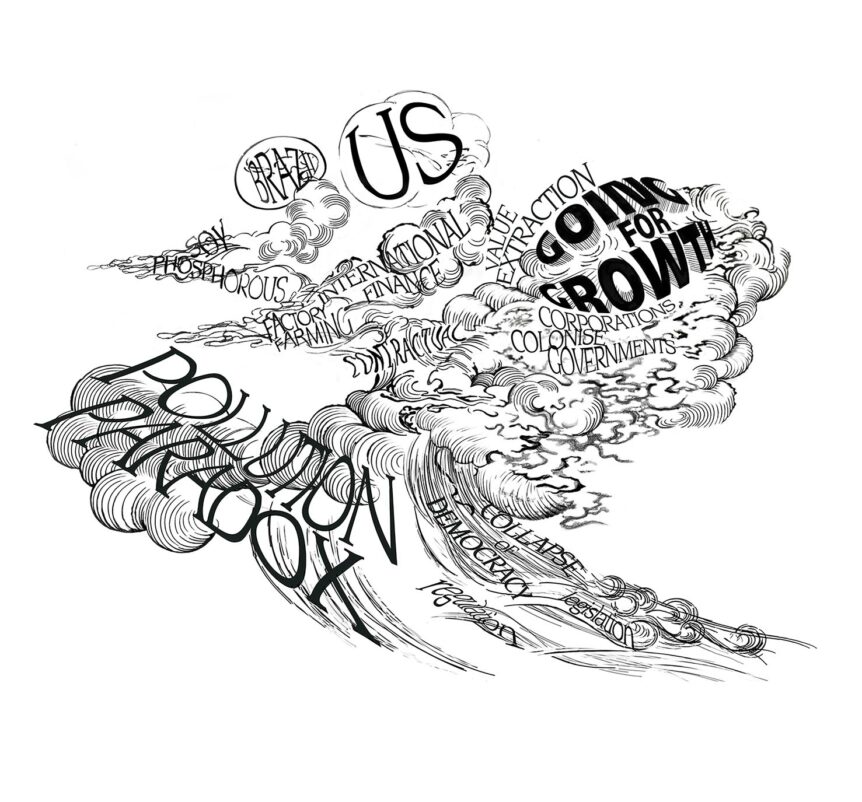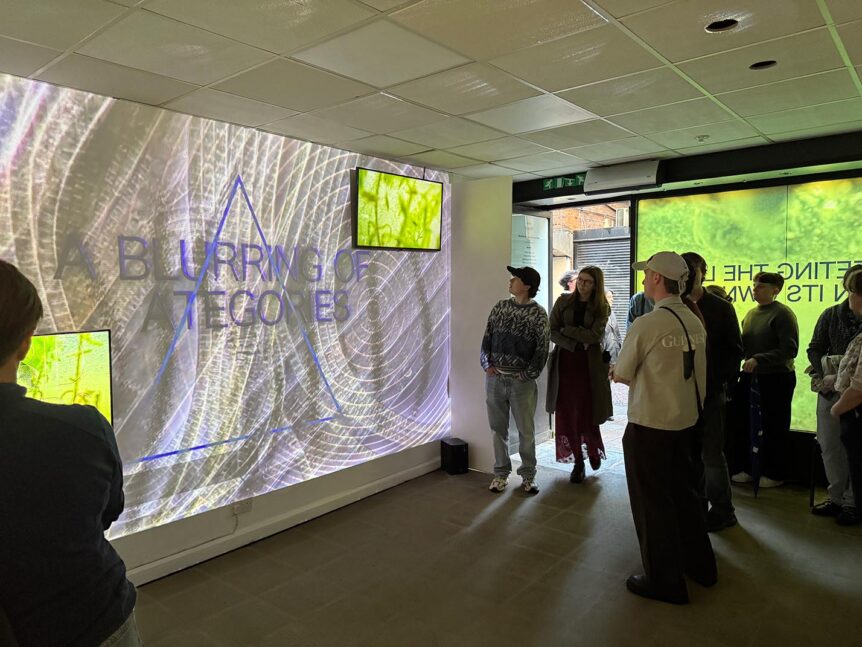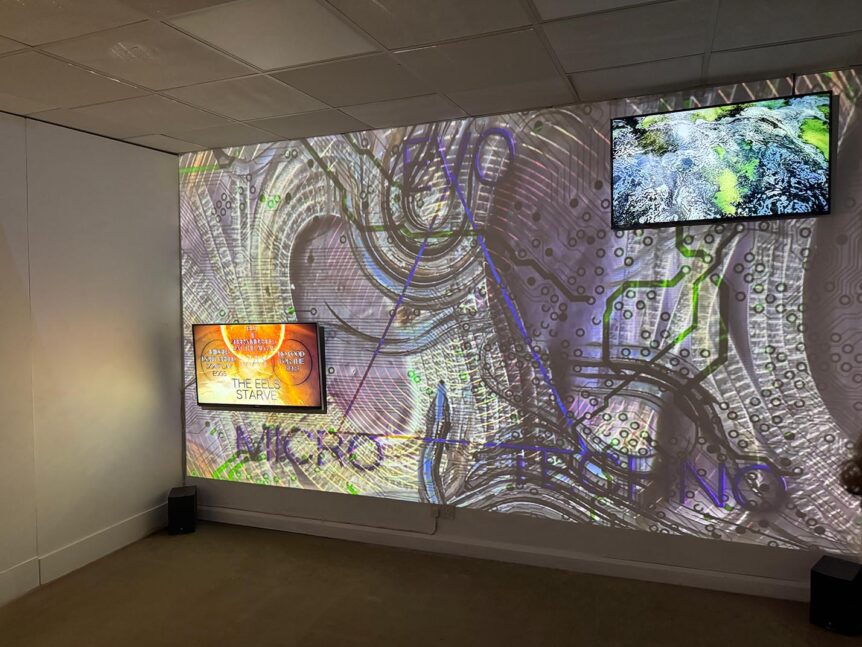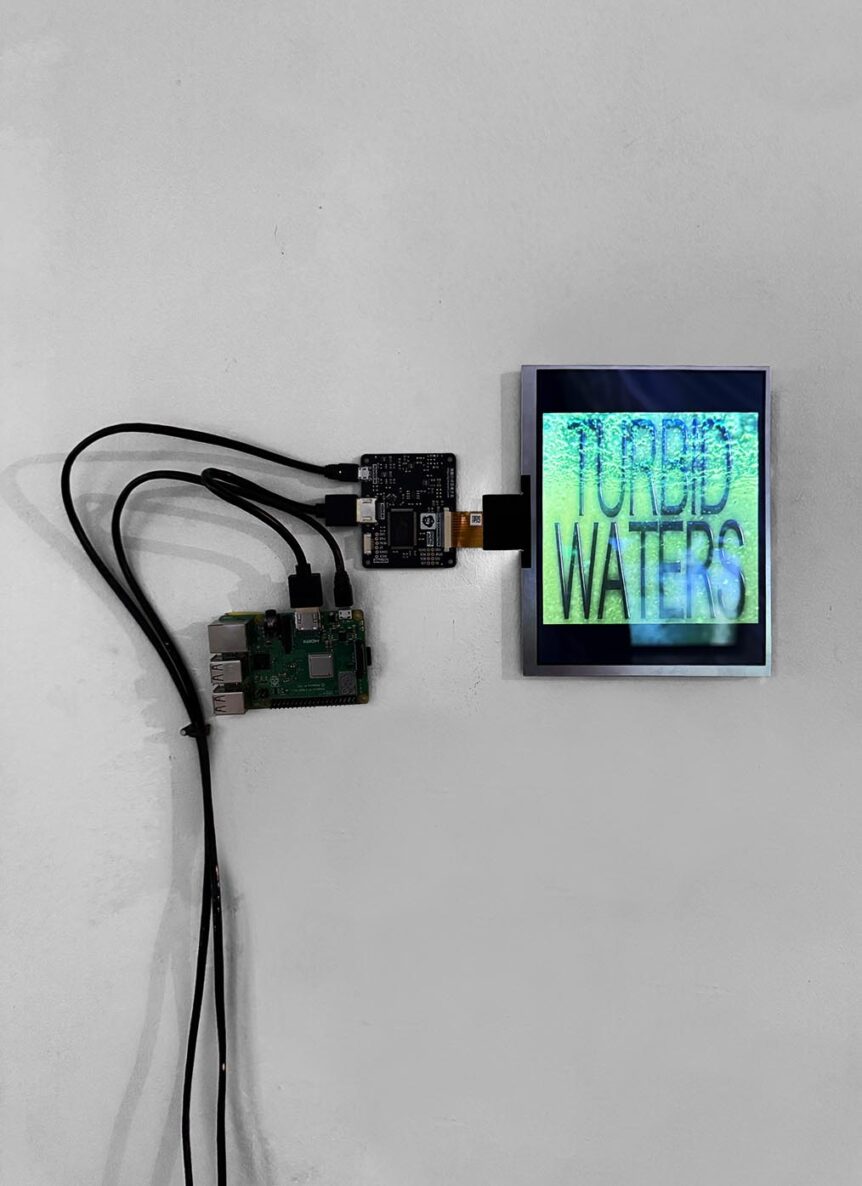What are the central themes in your “Meeting the Lough on its own terms” project?
Since 2023, I have made many field trips with FotE and local folks living around the lough, making it possible for me to record something of the multiple scales and temporalities that inform this multi-species perspective of the lough, combining drone footage with cinematography and underwater filming, and microscopic video at a microbial scale, with underwater audio recordings from the deepest point. I was fortunate to be able to further my research and development with scientists working on the Lough for several decades, identifying the Microcystis that’s the current cyanobacteria, which is dangerous as it’s a liver toxin. Previous algae bloom outbreaks at the lough in the 70’s were Anabaena.

Interestingly, to me, cyanobacteria were central to the evolutionary biologist Lynn Margulis’ research, who’s life traces the trajectory of both neo-Darwinism, and neoliberalism, both of which choose to emphasise the individual rather than the collective. My work maps how this story is intertwined with descriptions from evolutionary biology, that act to normalise and naturalise a very particular neoliberal mindset, within a specific world view and agenda, that is key to understanding how neoliberal ideology informs the current crisis, and many like it.
Cyanobacteria are fascinating, in that they brought oxygen to the atmosphere, and hence mass-speciation, and eventually humans. Margulis’ work on cyanobacteria lead to her developing her theory of symbiogenesis with an emphasis on a collaborative approach at the microbial scale, which was subsequently rejected by the Neo-Darwinists 17 times. She explored how the driver of evolution was not just DNA but in the cellular response to the environment. Research which we now consider as quite straightforward and obvious. The story of evolutionary biology is interesting because of the way it maps this very particular view of the world specific to the west, and in particular the UK (George Monbiot’s book: The Invisible Doctrine is useful in addressing how these ideas developed in the UK.) with an emphasis on a mechanistic science that viewed nature purely as a resource to be extracted from. The emphasis on privileging the individual above the collective, riddles its way through neoliberal doctrine ever since, with the resulting colossal disparity in wealth we see today. Today, ideas that so privilege the 1% that you’d have been mocked outright in decades gone by, are now regarded as completely regular. Normalised and naturalised, and riddled through with a very particular rhetoric borne of evolutionary biology, no less, that includes concepts of the selfish gene, and survival of the fittest. The extractive relations that you would associate with colonialism are par for the course, just exacted by other means. I mean, how strange is it that US and Brazilian investors in factory farming effect how much phosphorous is in a lough in Northern Ireland? Margulis would say we need to move on from this particular thought collective, because things simply don’t have to be this way – this is only one version of what’s possible.

My emphasis on de-centring the human (not de-valuing), as a more multi-species approach, that begins with ‘sensing’ the lough in a variety of different ways, means acknowledging that we are just one of many species. ‘Sensing’ in various ways, through sound recordings and listening to different species, as well as monitoring nutrient levels, for example, run alongside witnessing (analog) over extensive periods of time, and analysing what conditions in the lough tell us. This starts at the microbial scale, with regards to the over-abundance of phosphorous (from slurry, mostly) in the nutrient content, that means algae blooms become inevitable. The work is an attempt to diagram, if you like, the interdependencies across the many species that make up the loughs vulnerable eco-system: such as the non-indigenous zebra mussels, with the reduced numbers of chironomid flies (see Tommy Greene’s article in the Guardian 2024), and most recently the eels being too skinny to smoke, that meant that fishing had to stop – that are all key indicators of an ecosystem in collapse. In my mind, its absolutely crucial to grasp how the financial systems of today map onto this, in order to propagate more sustainable and balanced practices.
In summary, algae blooms offer a symptom of the climate crisis that emphasises the interconnectedness of vulnerable ecosystems with human-made systems. The microbial scale of the cyanobacteria (blue green algae) is important in allowing us to cut through the complexity, drawing our attention to certain indisputable material facts that show that there is simply too much phosphorous in Lough Neagh, at which point we can start to dismantle everything that makes it this way. It’s all about the nutrients! Our focus at the microbial scale has the potential to lead to a paradigm shift in thinking; a gut feeling, as we start to understand our relationship to nature in a more de-centred way. As just one species amongst the multitudes that live within the vulnerable eco-system of Lough Neagh, vital to finding a more sustainable equilibrium.

Unpacking how we got to this point, is actually really useful, because if you do this, it becomes really clear it doesn’t have to be this way. This version of reality is only one of many options. There has been a very quiet, but concerted effort to naturalise the most abhorrent economic policies under the guise of neoliberalism. The vulnerable ecosystem at Loch nEathach is an extraordinary example of how a mechanistic science views nature solely as a resource. And the consequences of this are that Loch nEathach is in such devastating plight. Ancient Irish Brehon law, for example, in stark contrast to English Common Law, is very interesting as it inscribes a collective relationship to water in poetry and rhyme, and its ideas like this that are now desperately needed. Environmental lawyer Thomas Muinzer speaks to this in some very eloquent ways, from the perspective of law today. Evolutionary biology also has this idea of emergence underlying its entire history, shared with probability theory, integral to the problem of autopoiesis. How do you conjure a future with the spark of life, the creative intelligence necessary, in order to change the system? The workshops we’ve held during our collective writing draw together some of the stories that flow through the lough and have lead to thinking about how older technologies, such as indigenous, pagan and herbalist approaches, might lend insights into a more balanced approach regarding how to recalibrate our relationship with nature today.
The collective writing comes together with sensing the lough, in the development of a sonic ritual, that develops this further. Rituals have acted historically as early technological interfaces, scoring human / nature relationships, in very particular ways.
Moving forwards, the sonic ritual is a work that attempts to develop a multi-species perspective during workshops with DAS Belfast XR group, thinking through alternative ways of ‘sensing’. It emphasises listening and sound, as practices central to de-centering the human, amongst the vulnerable ecologies of Lough Neagh and the watershed. Asking how human voice/s in a polyphonic approach might sit within this delicate ensemble, to reflect the new calibration we are hoping to bring about, with John D’Arcy (Sonic Arts Research Centre QUB) and HIVE Choir.

We will be starting a reading group, focussing on N. Katherine Hayles work Bacteria and AI, and I wanted to draw this together with Monbiot’s work on neoliberalism, and Byung-Chul Han’s book Psychopolitics that explores how neoliberalism discovered the productive force of the psyche, with his book on the absence of rituals today. Here, Hayles’ work is important to me, who also draws upon Margulis’, in her emphasis on the different kinds of sentience occurring across different species, amidst ideas of ‘cellular cognition’ and ‘meaning making’ with regards bio-chemical interactions with the environment. These conversations are so much more interesting to me than our current obsession with AI, to ask what kind of multi-species sentience might we be a part of, if we stop thinking of ourselves as the only species privileged with cognition.
We are going to be holding a ‘sensing’ the lough workshop the day after the exhibition opens at PS2, with Digital Arts Studios (DAS), thinking through how technology allows us to sense the lough in various ways, from a more multi-species perspective. How that informs new practices, new technologies, if you like, will be explored further with John D’Arcy and HIVE choir, in a sonic ritual jam, on the 5th September – all welcome.
www.pssquared.org/projects/meeting-the-lough-on-its-own-terms

My small offering is a site for thinking about these things, and is by no means finished. The video works, audio, and collective writing project that have been running for a year and a half, provide context for further conversations to develop and contributions to be made over the exhibition period. A lot of my work is process based, even in something so seemingly ‘finished’ as video: its just one articulation, and no doubt there will be many more. This sits well with my way of working, including Banner Repeater, the gallery that has conjoined with the Digital Archive of Artists’ Publishing over the last few years. The conversations that will be had at PS2 gallery and DAS, and with John D’Arcy at Sonic Arts (who have all been amazing to work with – I cannot thank them enough), will travel to Banner Repeater in October, with further contributions from other artists also working in these ways.
Watch SYMBIOGENESIS the story of Lynn Margulis here.
To learn more about the work of artist Ami Clarke’s work see the links below.

